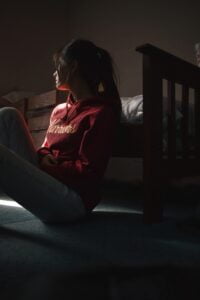 Bipolar disorder is a mental health condition also referred to as manic depression. This disorder typically involves noticeable mood changes and emotional highs and lows. It is a lifelong condition that is managed through medications and counseling. Women have been prone to this disorder through hormonal changes but must also experience some of the additional symptoms associated with bipolar disorder.
Bipolar disorder is a mental health condition also referred to as manic depression. This disorder typically involves noticeable mood changes and emotional highs and lows. It is a lifelong condition that is managed through medications and counseling. Women have been prone to this disorder through hormonal changes but must also experience some of the additional symptoms associated with bipolar disorder.
Understanding the causes of bipolar disorder can help with learning to identify bipolar symptoms in women. Bipolar disorder can be confusing and alarming to experience. You may feel like you are unable to find a steady rhythm in life. When you identify the symptoms, you can understand how to manage the disruptions bipolar disorder may cause.
What is mania and hypomania?
To understand bipolar symptoms in women, it is important to understand mania and hypomania. These terms define the emotional highs that accompany bipolar disorder.
Mania is defined by the high energy, excitement, or euphoria in the state of mind during an episode of bipolar disorder. Hypomania is characterized by the same state of mind as mania, but it is less intense in its severity.
What are the types of bipolar disorders?
There are four common types of bipolar disorder. Each of them affects women, but they may not affect women in the same way as they do men. Sometimes bipolar symptoms in women are not noticed until later in life. The symptoms are most often characterized by age, hormone factors, and even seasonal factors.
Bipolar I
This type of bipolar is signified by having at least one manic episode that lasts for one week. Sometimes depression may follow mania, but not always.
Bipolar II
Most women with this type of bipolar will exhibit hypomania followed by a depressed episode. There is typically a return to normal functioning in between episodes.
Cyclothymic Disorder
 Individuals with this disorder have the common symptoms of hypomania and depression where symptoms are visible half the time over two years. The symptoms in this form are less intense than other forms of bipolar disorder.
Individuals with this disorder have the common symptoms of hypomania and depression where symptoms are visible half the time over two years. The symptoms in this form are less intense than other forms of bipolar disorder.
Unspecified bipolar disorder
The symptoms of this type of bipolar disorder are like the above symptoms. However, there is not a significant number of symptoms to be diagnosed with one form of bipolar. This looks different for each woman which makes it a little more difficult to diagnose.
Nine most common bipolar symptoms in women.
Depression & mania.
These coincide when a woman cycles through these two symptoms almost at the same time. This keeps her from returning to normal and she ends up caught between these emotions and symptoms.
Euphoria.
It is common for manic episodes to occur before depressive episodes. This symptom is described as having an intense feeling of joy. Most of the time this can result in extreme excitability.
Decreased need for sleep.
Women who are experiencing a manic episode may feel as though they have enough energy to go without sleeping. Others may find it difficult to enjoy activities in their presence.
Psychosis.
During the manic state, a woman may experience feelings of believing things that are not true or even hallucinate. This can cause confusion, anger, or frustration. This symptom can be dangerous to the woman and those around her.
Irritability.
After a manic episode, the individual will often experience a state of depression. This may cause the person to become irritated easily at things that typically are not bothersome.
Feeling hopeless.
 When a woman is experiencing a depressive episode, she could feel intense hopelessness. She may question her future and anything positive about living. This can be a dangerous situation for her. If you notice her talking about self-harm or suicide, immediately reach out for help.
When a woman is experiencing a depressive episode, she could feel intense hopelessness. She may question her future and anything positive about living. This can be a dangerous situation for her. If you notice her talking about self-harm or suicide, immediately reach out for help.
Decreased judgment.
When a woman is experiencing mania, she may not have good judgment. She may react to a situation based on emotions without thinking about any consequences. She can end up in situations that could be dangerous.
Impulsive behavior.
The experience of mixed mania can lead a woman to make impulsive decisions. She may change tasks or topics on a whim. Most of the time these are things that the woman would not normally do.
Inability to concentrate.
Women who are experiencing depression may find it difficult to concentrate or even complete day-to-day tasks. They may also have a hard time with having complete thoughts.
Help for bipolar symptoms.
Bipolar symptoms in women are not always easy to identify as bipolar. It is also important to note that any of these symptoms can present differently in different women. One of the most common factors that have an impact on women rather than men is hormonal changes.
If you or a loved one is experiencing any of these symptoms reach out to a Christian counselor near you to get the help you need in managing these symptoms.
Photos:
“Sitting on the Floor”, Courtesy of Sofia Alejandra, Pexels.com, CC0 License; “Freaking Out”, Courtesy of Liza Summer, Pexels.com, CC0 License; “Walking on the Beach”, Courtesy of Dario Fernandez Ruz, Pexels.com, CC0 License
- Cyndi Kay Green: Author
Cyndi Kay Green is a freelance writer and owner of CyndiKay Media. In June 2020, she left the corporate world to become a full-time writer. She has been writing since 1996 with hopes of being able to walk in this calling that God had placed in her he...
DISCLAIMER: THIS ARTICLE DOES NOT PROVIDE MEDICAL ADVICE
Articles are intended for informational purposes only and do not constitute medical advice; the content is not intended to be a substitute for professional medical advice, diagnosis, or treatment. All opinions expressed by authors and quoted sources are their own and do not necessarily reflect the opinions of the editors, publishers or editorial boards of Stone Oak Christian Counseling. This website does not recommend or endorse any specific tests, physicians, products, procedures, opinions, or other information that may be mentioned on the Site. Reliance on any information provided by this website is solely at your own risk.





